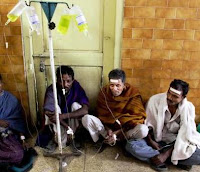BOOTLEG LIQUOR DEATHS
HIT 162 IN EASTERN INDIA
HIT 162 IN EASTERN INDIA
 Sangrampur, India (AP) - Police raided illegal distilleries and dismantled dozens of liquor dens Friday across an eastern Indian district where 162 people died after drinking methanol-tainted bootleg alcohol. 12 people were arrested in connection with making and distributing the cheap, illicit liquor, but police were still searching for the kingpin of the operation. Many of the victims were day laborers, street hawkers and rickshaw drivers who gathered along a road near a railway station after work Tuesday to drink the booze they bought for 10 rupees (20 cents) a half liter, less than a third the price of legal alcohol. They later began vomiting, suffering piercing headaches and frothing at the mouth, and by Friday morning 162 had died.
Sangrampur, India (AP) - Police raided illegal distilleries and dismantled dozens of liquor dens Friday across an eastern Indian district where 162 people died after drinking methanol-tainted bootleg alcohol. 12 people were arrested in connection with making and distributing the cheap, illicit liquor, but police were still searching for the kingpin of the operation. Many of the victims were day laborers, street hawkers and rickshaw drivers who gathered along a road near a railway station after work Tuesday to drink the booze they bought for 10 rupees (20 cents) a half liter, less than a third the price of legal alcohol. They later began vomiting, suffering piercing headaches and frothing at the mouth, and by Friday morning 162 had died. About 90 others, some in critical condition, were hospitalized in Diamond Harbour village for treatment. Doctors and other medical staff were working overtime to help. Illegal liquor operations flourish in India’s urban slums and among the rural poor who can’t afford alcohol at state-sanctioned shops. Bootleggers, often working in homes, hidden warehouses and even in forests, can turn a liter of genuine alcohol into 1,000 liters of bootlegged swill with chemicals and additives that usually cause no harm. However, sometimes it is mixed with cheap, toxic chemicals. Drinking alcohol contains ethanol, whereas highly toxic methanol - a clear liquid used as fuel, solvent or antifreeze - can induce comas and cause blindness and is deadly in high doses. In 2009, at least 112 people died from toxic alcohol in western India.
About 90 others, some in critical condition, were hospitalized in Diamond Harbour village for treatment. Doctors and other medical staff were working overtime to help. Illegal liquor operations flourish in India’s urban slums and among the rural poor who can’t afford alcohol at state-sanctioned shops. Bootleggers, often working in homes, hidden warehouses and even in forests, can turn a liter of genuine alcohol into 1,000 liters of bootlegged swill with chemicals and additives that usually cause no harm. However, sometimes it is mixed with cheap, toxic chemicals. Drinking alcohol contains ethanol, whereas highly toxic methanol - a clear liquid used as fuel, solvent or antifreeze - can induce comas and cause blindness and is deadly in high doses. In 2009, at least 112 people died from toxic alcohol in western India. Despite religious and cultural restrictions against drinking among Indians, an estimated 5 percent - roughly 60 million people - are alcoholics. Illegal liquor operations flourish in India’s urban slums and among the rural poor. The hooch is often mixed with cheap, toxic chemicals to increase potency and profit, with deadly consequences. Due to the influence of Kali, and without a culture of social drinking, people are looking for something that can offer them a cheap kick.
Despite religious and cultural restrictions against drinking among Indians, an estimated 5 percent - roughly 60 million people - are alcoholics. Illegal liquor operations flourish in India’s urban slums and among the rural poor. The hooch is often mixed with cheap, toxic chemicals to increase potency and profit, with deadly consequences. Due to the influence of Kali, and without a culture of social drinking, people are looking for something that can offer them a cheap kick.WHAT DO THE VEDIC TEACHINGS TELL US?
 That (Mahārāja Parīksit) is responsible king. Not that “They want to drink, and we can levy tax for drinking.” Because by, I mean to say, encouraging people drinking... That we see in India now. Gandhi’s started his movement on this basis. Nobody could drink even tea. At least amongst his associates, nobody could drink even tea. No cigarette. Gandhi was very strict. And of course, he could not prohibit, but he was also against illicit sex, drinking, gambling. But he prohibited. He introduced prohibition in so many states. But now government is encouraging. Government is giving license, “Yes, openly you can drink.” Kali’s influence. ... Because government knew it or know it that when a man becomes drunkard, he will drink at any cost. At any cost. Pramatta. Pramatta. Matta means mad, and pramatta means prakrista-rupena matta.
That (Mahārāja Parīksit) is responsible king. Not that “They want to drink, and we can levy tax for drinking.” Because by, I mean to say, encouraging people drinking... That we see in India now. Gandhi’s started his movement on this basis. Nobody could drink even tea. At least amongst his associates, nobody could drink even tea. No cigarette. Gandhi was very strict. And of course, he could not prohibit, but he was also against illicit sex, drinking, gambling. But he prohibited. He introduced prohibition in so many states. But now government is encouraging. Government is giving license, “Yes, openly you can drink.” Kali’s influence. ... Because government knew it or know it that when a man becomes drunkard, he will drink at any cost. At any cost. Pramatta. Pramatta. Matta means mad, and pramatta means prakrista-rupena matta.Śrīla A. C. Bhaktivedanta Swami Prabhupāda :
Lecture in Los Angeles, on January 7, 1974
Śrīmad Bhāgavatam 1.16.10 - 740107SB.LA
Complete Works of Srila Prabhupada
Lecture in Los Angeles, on January 7, 1974
Śrīmad Bhāgavatam 1.16.10 - 740107SB.LA
Complete Works of Srila Prabhupada
No comments:
Post a Comment